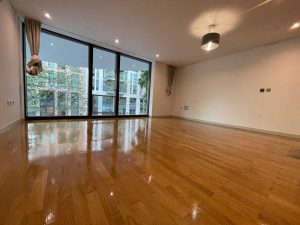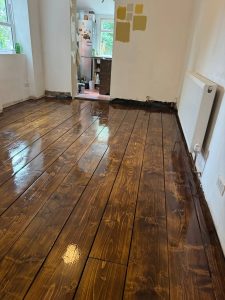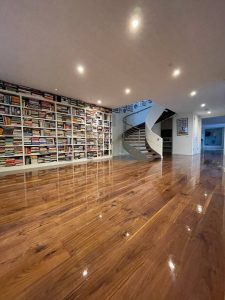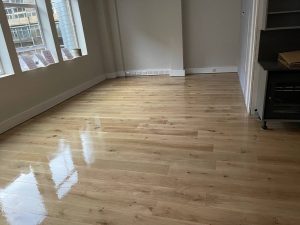The Best Finishing Techniques for Sanded Hardwood Floors

Hardwood floors are a timeless feature that can add elegance and value to any London home. After sanding your hardwood floors, applying the right finish is crucial to protect the wood and enhance its beauty. This guide will cover the best finishing techniques for sanded hardwood floors, ensuring a durable and stunning result.
Why Finishing is Important
Finishing your hardwood floors serves multiple purposes:
- Protection: A good finish protects the wood from damage caused by moisture, spills, and daily wear and tear.
- Enhancement: Finishing enhances the natural beauty of the wood, highlighting its grain and colour.
- Durability: Properly finished floors are more durable and easier to maintain, ensuring they last for years.
Types of Finishes
There are several types of finishes available, each with its own advantages:
1. Oil-Based Polyurethane
Oil-based polyurethane is a popular choice for its durability and rich, warm finish. It is ideal for high-traffic areas and provides excellent protection against scratches and stains. However, it takes longer to dry and can have a strong odour during application.
2. Water-Based Polyurethane
Water-based polyurethane dries quickly and has a low odour, making it a great option for homes with children and pets. It offers a clear, non-yellowing finish that preserves the natural colour of the wood. While it may not be as durable as oil-based options, it is easier to apply and clean up.
3. Hardwax Oil
Hardwax oil combines the benefits of oil and wax finishes, providing a natural, matte look. It penetrates the wood to enhance its natural beauty while offering a protective layer on the surface. Hardwax oil is easy to maintain and repair, making it a practical choice for busy households.
4. Shellac
Shellac is a traditional finish that offers a warm, glossy look. It is made from natural resin and alcohol, making it an eco-friendly option. While it dries quickly and is easy to apply, shellac is less durable than polyurethane and may require more frequent maintenance.
Finishing Techniques
1. Preparation
Proper preparation is essential for achieving the best results:
- Ensure the floor is clean and free of dust. Vacuum and wipe down the surface with a damp cloth.
- Sand the floor thoroughly, starting with a coarse grit and progressing to a fine grit. This ensures a smooth, even surface.
- Fill any gaps or cracks with wood filler and sand the area again for a seamless finish.
2. Application
Follow these steps for applying the finish:
- Stir the finish thoroughly before use to ensure an even consistency.
- Apply the finish with a brush, roller, or lambswool applicator, working in the direction of the wood grain.
- Apply thin, even coats to avoid drips and bubbles. Allow each coat to dry completely before applying the next.
- Lightly sand between coats with fine-grit sandpaper to ensure a smooth finish. Clean the floor thoroughly after sanding.
3. Drying and Curing
Allow the final coat to dry thoroughly. Keep the area well-ventilated to speed up the drying process. Avoid walking on the floor until the finish is fully cured, which can take several days to weeks, depending on the type of finish used.
Maintenance Tips
To keep your finished hardwood floors looking their best, follow these maintenance tips:
- Regularly sweep or vacuum to remove dirt and debris.
- Use felt pads under furniture to prevent scratches.
- Clean spills immediately to avoid staining.
- Refinish the floors as needed to maintain their appearance and protection.
Conclusion
Choosing the right finishing technique for your sanded hardwood floors can significantly enhance the beauty and durability of your London home. Whether you prefer the rich warmth of oil-based polyurethane, the quick-drying convenience of water-based finishes, or the natural look of hardwax oil, proper application and maintenance are key to long-lasting results. For professional floor finishing services in London, our team of experts is here to help. Contact us today to learn more about our services and how we can assist with your home improvement projects.






The Benefits of Refinishing Over Replacing Your Floors
The Benefits of Refinishing Over Replacing Your Floors Why refinishing is a cost-effective[Read more...]
How to Sand Floors with Decorative Inlays
How to Sand Floors with Decorative Inlays Sanding floors with decorative inlays[Read more...]
How to Incorporate Floor Sanding into Your Home Renovation
How to Incorporate Floor Sanding into Your Home Renovation Transform your London home with[Read more...]
The Best Floor Sanding Techniques for Kitchens and Bathrooms
The Best Floor Sanding Techniques for Kitchens and Bathrooms Kitchens and bathrooms are high-traffic[Read more...]
The Environmental Impact of Floor Sanding and How to Mitigate It
Environmental Impact of Floor Sanding Floor sanding is an essential process for maintaining[Read more...]
The Benefits of Refinishing Your Wooden Floors
The Benefits of Refinishing Your Wooden Floors Enhance the Beauty and Value of Your[Read more...]
The Best Floor Sanding Techniques for High-Traffic Areas
The Best Floor Sanding Techniques for High-Traffic Areas Maintaining the beauty and durability of[Read more...]
The Difference Between Floor Sanding and Refinishing
The Difference Between Floor Sanding and Refinishing Understanding the Best Options for Your London[Read more...]
The Importance of Professional Inspections Before Sanding
The Importance of Professional Inspections Before Sanding Ensure your London home is prepared for[Read more...]
Customer Testimonials: Real Stories of Floor Sanding Success
Hearing from satisfied customers is one of the best ways to understand the value and[Read more...]